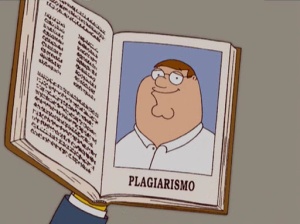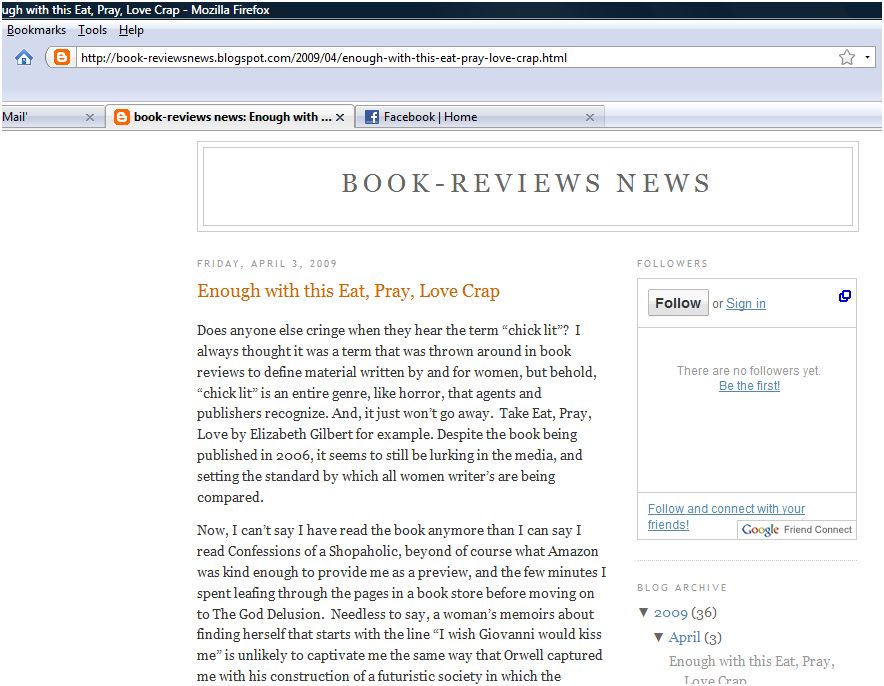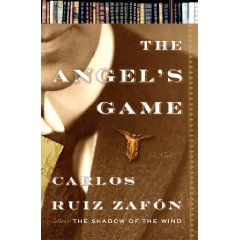 Yesterday morning I was browsing the Internet to see if anyone felt the same way about Eat, Pray, Love and chick lit in general, when I stumbled across a blogspot post with the title Enough with this Eat, Pray, Love Crap. Wow, I thought, someone feels exactly the same way I do. Little did I know, as I clicked on the link to read the post just how exact their feelings were to mine.
Yesterday morning I was browsing the Internet to see if anyone felt the same way about Eat, Pray, Love and chick lit in general, when I stumbled across a blogspot post with the title Enough with this Eat, Pray, Love Crap. Wow, I thought, someone feels exactly the same way I do. Little did I know, as I clicked on the link to read the post just how exact their feelings were to mine.
Word for word, my post was copied and pasted to this other post. For a moment I was speechless. I kept searching for a link back to my blog, or even a reference to my name as the author of the original. Nothing. This anonymous blogger known as Bookworm had literally stolen my intellectual property. Now I want it back.
It’s not that I am not flattered. I mean, it must say something about my writing if someone is willing to copy it and pass it off as their own. But it didn’t take long for the flattery to wear off and the, well let’s call it what it is, rage to set in. Yes, rage. I take my writing career very seriously, and this blog is my concerted effort to learn and document all that I can about the literary world, the struggles that writers face, and the feelings I have about everything in general. It’s like my professional diary on display for the whole world to see. It’s also here to give readers some insight into the type of writing I do, to develop my own unique literary voice, and hopefully build a following that will be excited when my first work goes to print.
I don’t make any money from this blog. After switching to a more professional format, I decided not to use ads, because the entire site itself is an advertisement of my writing. Plus, I hate them as much as everyone else, and the possibility of earning a few bucks from ads was not worth alienating readers. So why am I so pissed off by this little act of brazen plagiarism if it’s not really costing me anything? Because those words are my intellectual property.
Intellectual property refers to creations of the mind: inventions, literary and artistic works, and symbols, names, images, and designs used in commerce. Intellectual property is divided into two categories: Industrial property, which includes inventions (patents), trademarks, industrial designs, and geographic indications of source; and Copyright, which includes literary and artistic works such as novels, poems and plays, films, musical works, artistic works such as drawings, paintings, photographs and sculptures, and architectural designs. Source: World Intellectual Property Organization.
Intellectual property isn’t just some term writers and artists came up with to pretentiously describe their writing. It is a legally recognized category of property established in copyright law, and meant to protect those whose work is slightly less tangible than that of physical property. Personally, I had thought about this issue when I first began this humble little blog, and clearly posted the following on the site to protect myself from word thieves;
Creative Commons: You may duplicate this work providing that you contact the author prior to distributing work from this site as the majority of samples have been previously published elsewhere. All credit must be given to the author. Creative Commons License: This work is licenced under a Creative Commons Licence.
Posting a creative commons license on my site was my way of saying “Hey, I’m cool with you reproducing my work, as long as you get consent first, and give me credit where credit is due”. Creative Commons defines their services as follows;
Creative Commons is a nonprofit corporation dedicated to making it easier for people to share and build upon the work of others, consistent with the rules of copyright. We provide free licenses and other legal tools to mark creative work with the freedom the creator wants it to carry, so others can share, remix, use commercially, or any combination thereof.
Please note that yes, I am quoting directly from their site, but I am also providing a functioning link back to their site so readers know where I got my information, can verify it, and learn more should they choose to. Maybe it’s the academic still left lingering in me, but citing sources is fundamentally important. Otherwise, it is flat out plagiarism.
Now, here’s where it gets interesting. Blogging is a relatively new phenomenon, at least to the average person. Note that the WIPO recognizes literary works such as novels, but is silent on the rules as the apply to the Wild West the Internet. However, the basic premise remains the same. If I had written the Eat, Pray, Crap article with the intent on including it in a nonfiction book, I would have legal grounds to stand on. What are my legal grounds on the Internet?
The link love rule seems to be the unspoken standard among bloggers. Like I said, I would be fine with a portion, or even all of the post being copied if two things had been present; my name and a link to my blog where the post originated. In the case of Bookworm/Word Thief, neither appeared, so I am left to believe, along with other readers, that this writing is their original work, when it is categorically not. I even went so far as to leave a comment on the site, informing the owner of that blog that I recognized the post as my own and requested a link back. As of 10:23 AM in my time zone, none appeared. I’m still fuming.
How does one effectively fight plagiarism on the web? It’s not like there is a phone number for blogspot that one can call and report plagiarism. There’s no risk of Bookworm flunking a course because of his/her actions. There is actually no means of communicating with this person except in their comments section, an avenue I have already exhausted. The only weapon I have left are my words, and each time I lay those out on a public forum like my blog, I run the risk of having them stolen and passed off as belonging to someone else. Let me put it another way; if someone stole my car, and passed it off as their own, it would unequivocally be considered theft, but my writing is worth more to me than my car, so what am I left to do but stare at the stolen post in anger and dismay?
I’m going to do the only thing I know how; scream it from the rooftops (and by rooftops I mean my desk). I can bring as much attention to this issue as possible, and encourage people to be diligent in protecting their words as though they were as precious as any piece of physical property they own. I can also ask for your help in inundating Bookworm with comments on their site calling them out on their act of plagiarism and insisting that they rectify it by the means I listed above, or take the post down altogether.
So, will you help me? You can leave comments on the doppelganger post here. Thank you!

A Word Thief Busted!
 I picked up The Angel’s Game by Carlos Ruiz Zafon last week after a colleague recommended it, and settled in, somewhat skeptically, to give a new writer (by new, I mean one I had not read previously) a fair shot. It had been described to me as a dark mystery by a writer who Stephen King recently raved about. And as one of King’s Constant Readers, I trust his word more than I’d trust that of any clergyman.
I picked up The Angel’s Game by Carlos Ruiz Zafon last week after a colleague recommended it, and settled in, somewhat skeptically, to give a new writer (by new, I mean one I had not read previously) a fair shot. It had been described to me as a dark mystery by a writer who Stephen King recently raved about. And as one of King’s Constant Readers, I trust his word more than I’d trust that of any clergyman. Last time, I talked about the supposed demise of books due to the technological revolution and the uphill battle that publishers and pushers of paper of all kinds are facing with the combined force of a weakened economy and a (relatively) free forum like the Internet from which to gather information. I questioned
Last time, I talked about the supposed demise of books due to the technological revolution and the uphill battle that publishers and pushers of paper of all kinds are facing with the combined force of a weakened economy and a (relatively) free forum like the Internet from which to gather information. I questioned  For those of you who know me, thanks for following me from one blog to the next. For those who don’t, my name is Jennifer Astle (please, call me Jenn) and I’m a writer. Although I have always been a “writer” in some form or another, the whole freelance business began when a friend of mine (and legal counsel) advised me to start a blog to occupy my spare time. I had a lot of spare time because I was immigrating to the United States from Canada (I miss you all!), and thus began my freelance writing career.
For those of you who know me, thanks for following me from one blog to the next. For those who don’t, my name is Jennifer Astle (please, call me Jenn) and I’m a writer. Although I have always been a “writer” in some form or another, the whole freelance business began when a friend of mine (and legal counsel) advised me to start a blog to occupy my spare time. I had a lot of spare time because I was immigrating to the United States from Canada (I miss you all!), and thus began my freelance writing career.
Hey, That’s My Intellectual Property
Word for word, my post was copied and pasted to this other post. For a moment I was speechless. I kept searching for a link back to my blog, or even a reference to my name as the author of the original. Nothing. This anonymous blogger known as Bookworm had literally stolen my intellectual property. Now I want it back.
It’s not that I am not flattered. I mean, it must say something about my writing if someone is willing to copy it and pass it off as their own. But it didn’t take long for the flattery to wear off and the, well let’s call it what it is, rage to set in. Yes, rage. I take my writing career very seriously, and this blog is my concerted effort to learn and document all that I can about the literary world, the struggles that writers face, and the feelings I have about everything in general. It’s like my professional diary on display for the whole world to see. It’s also here to give readers some insight into the type of writing I do, to develop my own unique literary voice, and hopefully build a following that will be excited when my first work goes to print.
I don’t make any money from this blog. After switching to a more professional format, I decided not to use ads, because the entire site itself is an advertisement of my writing. Plus, I hate them as much as everyone else, and the possibility of earning a few bucks from ads was not worth alienating readers. So why am I so pissed off by this little act of brazen plagiarism if it’s not really costing me anything? Because those words are my intellectual property.
Intellectual property isn’t just some term writers and artists came up with to pretentiously describe their writing. It is a legally recognized category of property established in copyright law, and meant to protect those whose work is slightly less tangible than that of physical property. Personally, I had thought about this issue when I first began this humble little blog, and clearly posted the following on the site to protect myself from word thieves;
Posting a creative commons license on my site was my way of saying “Hey, I’m cool with you reproducing my work, as long as you get consent first, and give me credit where credit is due”. Creative Commons defines their services as follows;
Please note that yes, I am quoting directly from their site, but I am also providing a functioning link back to their site so readers know where I got my information, can verify it, and learn more should they choose to. Maybe it’s the academic still left lingering in me, but citing sources is fundamentally important. Otherwise, it is flat out plagiarism.
Now, here’s where it gets interesting. Blogging is a relatively new phenomenon, at least to the average person. Note that the WIPO recognizes literary works such as novels, but is silent on the rules as the apply to the Wild West the Internet. However, the basic premise remains the same. If I had written the Eat, Pray, Crap article with the intent on including it in a nonfiction book, I would have legal grounds to stand on. What are my legal grounds on the Internet?
The link love rule seems to be the unspoken standard among bloggers. Like I said, I would be fine with a portion, or even all of the post being copied if two things had been present; my name and a link to my blog where the post originated. In the case of Bookworm/Word Thief, neither appeared, so I am left to believe, along with other readers, that this writing is their original work, when it is categorically not. I even went so far as to leave a comment on the site, informing the owner of that blog that I recognized the post as my own and requested a link back. As of 10:23 AM in my time zone, none appeared. I’m still fuming.
How does one effectively fight plagiarism on the web? It’s not like there is a phone number for blogspot that one can call and report plagiarism. There’s no risk of Bookworm flunking a course because of his/her actions. There is actually no means of communicating with this person except in their comments section, an avenue I have already exhausted. The only weapon I have left are my words, and each time I lay those out on a public forum like my blog, I run the risk of having them stolen and passed off as belonging to someone else. Let me put it another way; if someone stole my car, and passed it off as their own, it would unequivocally be considered theft, but my writing is worth more to me than my car, so what am I left to do but stare at the stolen post in anger and dismay?
I’m going to do the only thing I know how; scream it from the rooftops (and by rooftops I mean my desk). I can bring as much attention to this issue as possible, and encourage people to be diligent in protecting their words as though they were as precious as any piece of physical property they own. I can also ask for your help in inundating Bookworm with comments on their site calling them out on their act of plagiarism and insisting that they rectify it by the means I listed above, or take the post down altogether.
So, will you help me? You can leave comments on the doppelganger post here. Thank you!
A Word Thief Busted!